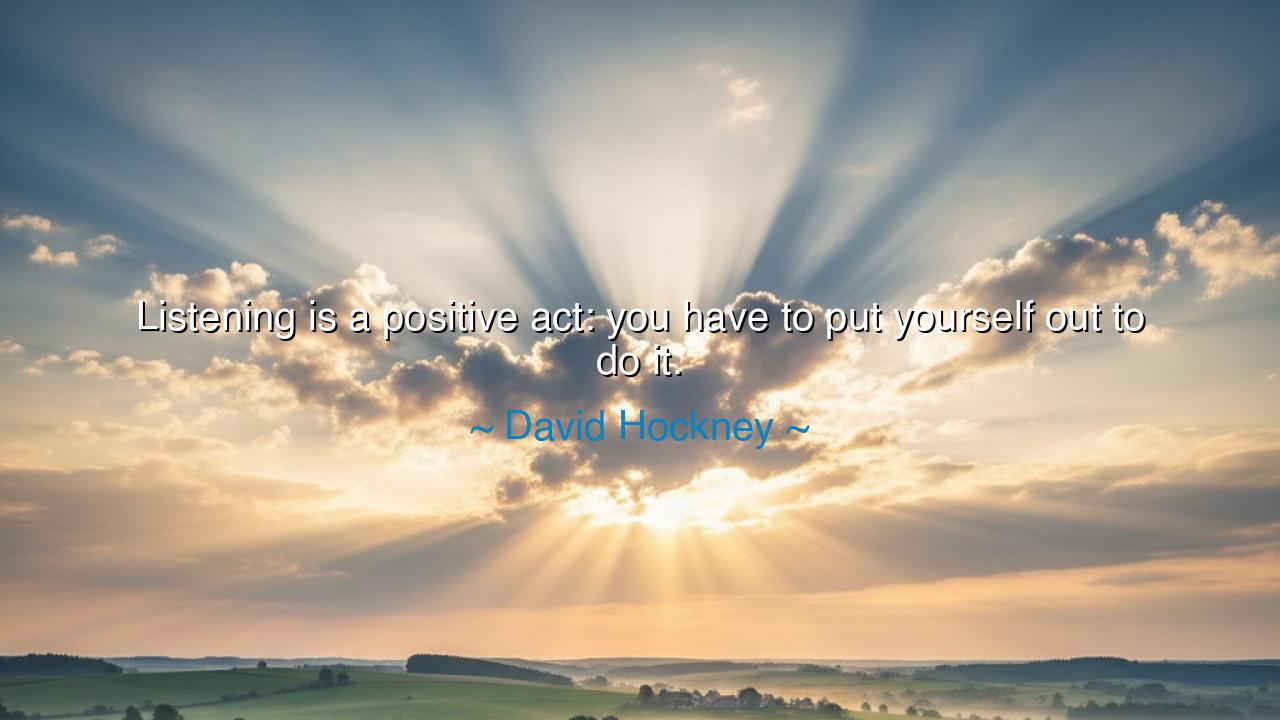
Listening is a positive act: you have to put yourself out to do






When David Hockney declared, “Listening is a positive act: you have to put yourself out to do it,” he revealed a truth often overlooked in the noise of the world. To listen is not to sit passively and wait for words to end; it is to open the gates of the heart, to lay aside the self, and to allow another’s voice to enter and dwell within you. It is not weakness but strength, for it demands humility, patience, and the will to place another’s truth before your own.
The ancients understood this well. In the dialogues of Socrates, wisdom was born not from constant speaking, but from questioning and listening. The philosopher was never merely a talker; he was a listener, drawing out the thoughts of others so that truth might be revealed. To listen was to practice philosophy itself, for in hearing another fully, one approached the deeper currents of the soul. Thus, Hockney’s words remind us that listening is an act, an exertion of will, not the silence of neglect but the silence of reverence.
History bears witness to the power of this art. Consider Abraham Lincoln, who, during the storms of the American Civil War, spent long hours listening to soldiers, citizens, and rivals alike. His strength as a leader was not only in speeches but in the ears that heard the pain, the anger, and the hope of the people. He put himself out to listen, and by doing so, he bound a fractured nation with empathy. In him we see the truth of Hockney’s wisdom: that listening creates connection, and connection creates strength.
There is also a hidden courage in listening. To truly hear another is to risk being changed by them. It is to step beyond the fortress of one’s ego and allow new ideas, new emotions, and new truths to touch the soul. Many avoid this, preferring to speak endlessly, filling the air with their own certainty. But the brave choose instead the positive act of listening, and in that vulnerability they gain more than they lose.
The heart of this teaching is that listening is an act of love. To listen is to say: your words matter, your story has value, your being is worthy of my attention. In a world where voices clamor to be heard, to truly listen is a gift rarer than gold. It is through listening that friendships deepen, conflicts heal, and wisdom grows. Without listening, there can be no understanding; without understanding, there can be no peace.
The lesson is clear: practice the discipline of listening. When someone speaks, resist the urge to prepare your reply. Instead, set yourself aside and lean into their words. Ask questions, seek clarity, and show with your silence that you honor them. In family, in friendship, in work, let listening be your foundation, for it will build bonds stronger than iron.
In practice, this means putting yourself out — turning away from distractions, silencing the inner noise, and being fully present. Make eye contact, show patience, and reflect back what you hear. Do not rush to judgment, but let the other’s truth breathe in the space between you. For in this simple act lies profound power: the power to heal, to unite, to inspire.
Therefore, remember David Hockney’s wisdom: listening is a positive act, a conscious choice to step beyond yourself and honor another. Do this often, and you will find that the world grows larger, your spirit grows deeper, and your relationships grow stronger. For in listening, you do not lose yourself — you discover the richness of humanity that dwells all around you.






LTle thuy
This quote makes me reflect on my own habits—how often do I truly listen versus waiting to speak? I wonder if modern communication tools, like texting or social media, make it harder to engage in this kind of active listening. Could training in deliberate listening improve not only personal relationships but also professional leadership? I’d like to explore what techniques or mindsets make listening genuinely positive and transformative rather than just obligatory.
NANguyen Anh
Reading this makes me question how listening intersects with empathy. Does putting yourself out to listen inherently require you to empathize, or can one actively listen without emotional involvement? Also, could this principle be applied to broader societal issues, like listening to marginalized voices? I’m intrigued by how effortful listening might change our understanding of others and whether it could become a form of action or even social responsibility.
HVNguyen Ha Vy
I find this idea both inspiring and slightly challenging. It suggests that listening requires vulnerability and attention, which can be draining in today’s fast-paced world. But is it possible that the act of listening could also be rewarding for the listener, beyond helping the speaker? I’d like to hear perspectives on practical ways to consistently practice active listening, especially in situations where emotions run high or distractions are constant.
VCNguyen van cuong
This perspective really highlights listening as an active effort rather than a passive skill. It makes me wonder: how often do we truly ‘put ourselves out’ to hear someone else, especially when it’s uncomfortable or challenging? Could practicing intentional listening improve relationships, workplace dynamics, or even self-awareness? I’m also curious whether the ability to listen deeply is innate or a skill that can be cultivated with conscious effort over time.